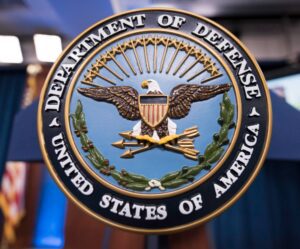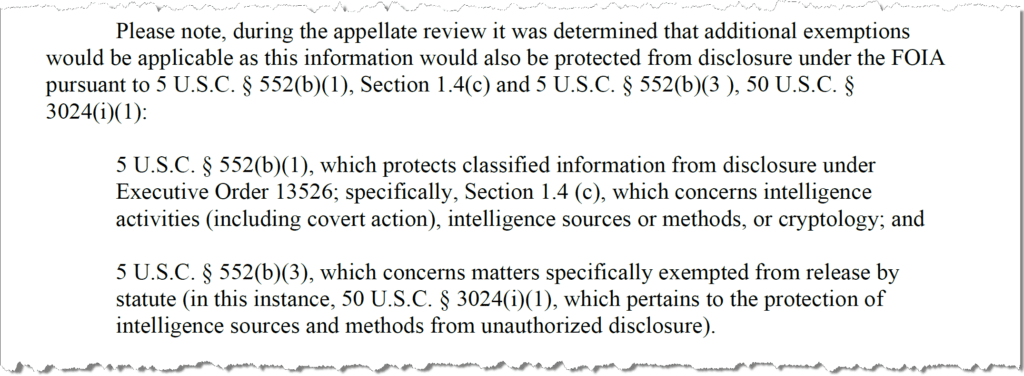[ad_1]
- The Department of Defense (DoD) upheld (b)(7)(A) and (b)(7)(E) exemptions in response to six FOIA appeals filed by The Black Vault challenging the classification of UAP information under law enforcement exemptions.
- During the appellate review, the DoD introduced additional exemptions not previously cited, including those covering classified information on intelligence activities and matters exempted from release by statute.
- Despite multiple attempts to obtain a comment from a DoD spokesperson regarding these developments, no response has been received after months of attempts, continuing the trend of governmental secrecy surrounding UAP phenomena.
- The introduction of new exemptions presents heightened challenges for The Black Vault should the decision to litigate for information release be taken.
In the ongoing fight for transparency regarding Unidentified Aerial Phenomena (UAP), The Black Vault just encountered additional hurdles that make the effort even more difficult to achieve. A series of Freedom of Information Act (FOIA) appeals were filed to challenge the Department of Defense’s (DoD) use of exemption (b)(7) blocking access to various UAP and UFO related documents within the All-domain Anomaly Resolution Office (AARO). This specific exemption pertains to records or information compiled for law enforcement purposes, which could interfere with enforcement proceedings.
The Black Vault argued that AARO, along with other past names of similar efforts like the AOIMSG and UAPTF, were not law enforcement agencies. Furthermore, there’s no acknowledged law enforcement investigation that requires the concealment of the requested information.
 Last week, the DoD responded to six of these appeals, upholding the (b)(7)(A) and (b)(7)(E) exemptions. These exemptions concern potential interference with enforcement proceedings and the disclosure of techniques and procedures for law enforcement investigations or prosecutions, respectively, but again the DoD fails to present what “law enforcement” proceeding it would interfere with.
Last week, the DoD responded to six of these appeals, upholding the (b)(7)(A) and (b)(7)(E) exemptions. These exemptions concern potential interference with enforcement proceedings and the disclosure of techniques and procedures for law enforcement investigations or prosecutions, respectively, but again the DoD fails to present what “law enforcement” proceeding it would interfere with.
In an OpEd published on The Hill in June 2023 by Marik von Rennenkampff, it was proposed that these denials are “…circumstantial evidence that a law enforcement entity, such as the Department of Defense Office of Inspector General [DoD/IG], is engaged in a broad, and possibly criminal, investigation of the U.S. government’s involvement with UFOs.” Though, no evidence supports this.
The DoD/IG’s “evaluation” is now closed as of August 15, 2023, thus nullifying the (b)(7) exemption use, yet, the appellate authority claims it still applies in their September 29th, 2023, decisions. In addition to that, the Intelligence Community Inspector General (IC IG) stated in a September 15, 2023, letter to multiple Congressman and Congresswomen, “…IC IG notes that it has not conducted any audit, inspection, evaluation, or review of alleged UAP programs.” This statement, unless untrue or a daring but clever use of word choices hiding their “investigation”, rules out the IC IG being the root of a “law enforcement” exemption use. So, it remains a mystery on exactly why the exemption is being cited.
Despite multiple attempts over several months to obtain a comment from a DoD spokesperson regarding the use of the “law enforcement” related exemptions, no response has been received at the time of writing this article. The silence from the DoD adds to the growing aura of secrecy surrounding the UAP phenomena and the government’s handling of related information.
But in a surprising turn, during the appellate review, the DoD introduced even more exemptions not cited in the original FOIA denial.

50 U.S.C. § 3024(i)(1) is a provision in the United States Code that mandates the protection of intelligence sources and methods from unauthorized disclosure. This exemption serves to withhold sensitive information concerning national intelligence activities, methods, or the identities of individuals involved, from being released to the public, ensuring the continued efficacy and security of intelligence operations.

The introduction of new exemptions fortifies the existing barrier between the public and the information on UAP, potentially making any future litigation an even more challenging endeavor. These additional layers of exemption signify a strong intent to keep UAP records shielded from the public eye, and present an even bigger challenge to overcome should The Black Vault decide to proceed to court for the release of this information.
The American public’s significant interest in UAPs and the activities of AARO is mirrored by extensive mainstream media coverage. Under FOIA, balancing this public interest against governmental confidentiality is crucial, yet the scales seem to be heavily tipped towards secrecy in this ongoing saga. It should also be noted, that no current or proposed Congressional legislation will fully overwrite these exemptions. Although proposed amendments, like the “Unidentified Anomalous Phenomena (UAP) Disclosure Act of 2023”, may aim to open up UAP related records to the public, it does not overwrite any ability by the U.S. government to continue to redact and exempt this information from public disclosure. Documents like the UAP Security Classification Guide (SCG) will continue to allow the full exemption of more modern UAP related material, should the DoD desire to do so. FOIA exemptions, and numerous other statutes, could also still fully apply to older UAP material.
Former Deputy Assistant Secretary of Defense for Intelligence, Christopher Mellon, also has cited the UAP SCG as a roadblock that Congressional language will not circumvent:
Although this is very encouraging, until & unless the overly restrictive UAP security classification guide is revised, there will be little public benefit as virtually all recent data, including UAP videos, will be classified. Congress should press ahead for this guidance to be… https://t.co/JLQdPQoMka
— Christopher K. Mellon (@ChrisKMellon) July 14, 2023
This battle for transparency highlights a broader narrative of governmental secrecy. Each denial and every newly introduced exemption underscores the substantial hurdles faced in shedding light on the unknown, particularly concerning phenomena that captivate public interest and imagination.
###
Follow The Black Vault on Social Media:
[ad_2]
Source link